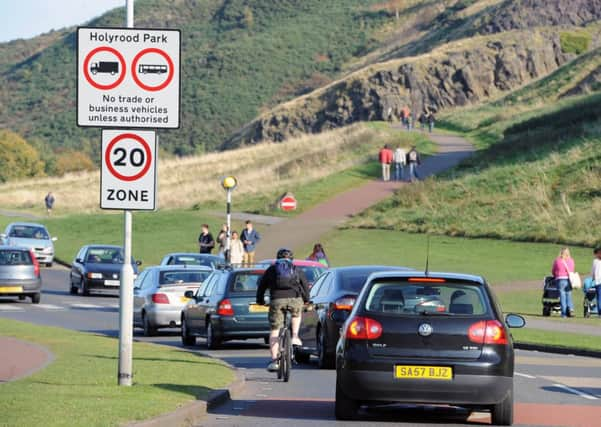Leaders: Common sense declines with speed limits


So that must be a good thing, right? Not everyone will agree, by any means.
The speed cut comes hard on the heels of the lowering of the drink-drive limit, which critics say has had a damaging effect on rural pubs as well as places such as golf club bars. Social drinkers who would previously limit themselves to a pint of beer or a glass of wine have largely decided it is not worth the risk, and decided to stay at home and drink instead.
CONNECT WITH THE SCOTSMAN
Advertisement
Hide AdAdvertisement
Hide Ad• Subscribe to our daily newsletter (requires registration) and get the latest news, sport and business headlines delivered to your inbox every morning
Edinburgh already has 20mph limits around schools and in many residential areas, where the danger to pedestrians is highest. So what does the extension hope to achieve? A reduction in accidents, certainly. But there would be even fewer if speeds were cut to 10mph, and fewer still if cars were banned from the city centre. Where does one draw the line? And does there come a point where the council realises its job is not to eliminate risk from daily life?
This decision will disadvantage many people who simply want to get from A to B with the minimum of fuss and delay.
If the council and government go galloping down this risk-elimination road, the constraints on ordinary citizens will become insufferable. It is hard to believe that council officials have considered the inconvenience their measures will cause, not to mention the extra burden in dealing with the inevitable transgressions that will result.
The link between the drink- drive limit and the speed limit is the “nanny state”. Concerns about overbearing officialdom are often legitimate and justified. We risk being overgoverned, because those in positions of authority have lost their sense of proportion.
Their job is surely not to bear down ever more heavily on our lives, but to free us up to live them. A fundamental misunderstanding about their role in the city and the country at large seems to be at play here. Measures such as these may sound sensible in the debating chamber, but on the street it will be met with puzzlement and irritation.
Where, people will ask, is the public outcry about the 30mph limit that has necessitated the city’s elected representatives to respond in this way.
The answer, of course, is that there has been none. The 30mph has been existence for decades and – when traffic jams allow a speed of greater than 5mph – it has seemed like an appropriate level at which to curb the worst behaviour of dangerous boy-racer types. So what changed? And where is the evidence that the lower drink-drive limit will have more effect than the old one?
Advertisement
Hide AdAdvertisement
Hide AdAbove all other considerations, what we hope for in leaders is common sense, rationality and proportionality. Along with the new limits, that also seems to be declining.
Unity above division
IN THIS newspaper today, and in our digital editions, you will not find a picture of the latest cover of satirical magazine Charlie Hebdo, which this week prints a special edition to commemorate the staff members brutally slain in cold blood last week by Islamist terrorists.
In our coverage today we tell our readers what is on that cover – a cartoon depicting the Prophet Muhammad crying, while holding a “Je suis Charlie” sign, under the headline: “All is forgiven”. But we have taken the editorial decision not to visually reproduce the cover.
We are aware this will anger some people who urge solidarity with Charlie Hebdo in standing up for the principles of free speech.
We agree wholeheartedly that freedom of speech is a precious liberty that must be defended. The killing of the cartoonists and editorial staff of the magazine united the civilised world in revulsion.
It does not follow, however, that in supporting the right to be offensive, this newspaper itself must be offensive. Because let us be clear, mainstream Muslim opinion around the globe, including here in Scotland, is offended by depictions of the Prophet.
If one asks oneself, what is the ultimate aim of the Paris terrorists behind the magazine massacre and hostage-taking at a Jewish supermarket, the logical answer would seem to be that they want to create a state of war between the West and the Islamic world, their murderous work is to end freedom and tolerance.
In our response, therefore, we must consider what actions will bring unity not division. That priority has determined this newspaper’s position.